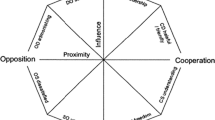Conclusion
The goals of this project were to design and implement a series of courses that would better prepare elementary school teachers to teach science and would promote positive attitudes toward science and science teaching. The initial offering of the first series of courses met with moderate success. Although the courses fostered an increase in cognitive knowledge, the magnitude of the improvement was not what we had anticipated. There was no significant improvement in the attitudes of the students toward science or science teaching.
The science course has been revised and is currently being offered for both preservice and inservice teachers. The revisions include lengthening the class time, so that the material can be covered at a more relaxed pace, and increasing the amount of active team teaching by the instructors to further emphasize the interrelations between chemistry and biology and to eliminate the fragmentation of the course. It is hoped that these changes will also have a positive impact on the students’ attitudes toward the course and thus toward science in general.
Similar content being viewed by others
References
Blank, R. (1988). Improving research on teacher quality in science and mathematics: Report of a symposium of scientists, educators, and researchers.Journal of Research in Science Teaching,25, 217–224.
Gallagher, J. J. (1985). A summary of research in science education.Science Education,71(3).
Goodlad, J. I. (1983).A place called school: Prospects for the future. New York: McGraw-Hill.
Harms, N., & Kahl, S. (1980).Project Synthesis final report. Washington, DC: National Science Foundation.
Helgeson, S.L., Blosser, P. E., & Howe, R. W. (1978).Science Education, Volume 1, The status of pre-college science, mathematics, and social studies education: 1955–1975. Washington, DC: U.S. Government Printing Office.
National Commission on Excellence in Education. (1983).A nation at risk: The imperative for education reform. Washington, DC: U.S. Government Printing Office.
National Science Teachers Association. (1986). Preschool and elementary level science education: Standards for the preparation and certification of teachers in science K-12. InNSTA Handbook (1986–87). Washington, DC: Author.
Penick, J. E. (1983).Focus on excellence: Elementary science (Vol. 1). Washington, DC: National Science Teachers Association.
Shymansky, J. A. (1986). A summary of research in science education.Science Education,72(3).
Stake, R. E., & Easley, J. A., Jr. (1978).Case studies in science education. Washington, DC: U.S. Government Printing Office.
Staver, J. R., & Bay, M. (1987). Analysis of the Project Synthesis goal cluster orientation and inquiry emphasis of elementary science textbooks.Journal of Research in Science Teaching,24, 629–643.
Weiss, I. R. (1978).Report of the 1977 National Survey of Science, Mathematics, and Social Studies Education. Washington, DC: U.S. Government Printing Office.
Yager, R. E., & Penick, J. E. (1988). Changes in perceived attitudes toward the goals for science instruction in schools.Journal of Research in Science Teaching,25, 179–184.
Author information
Authors and Affiliations
About this article
Cite this article
DeTure, L.R., Gregory, E. & Ramsey, B.G. A program to improve elementary teacher preparation in science at Rollins College. J Sci Teacher Educ 1, 49–53 (1990). https://doi.org/10.1007/BF02614715
Issue Date:
DOI: https://doi.org/10.1007/BF02614715




